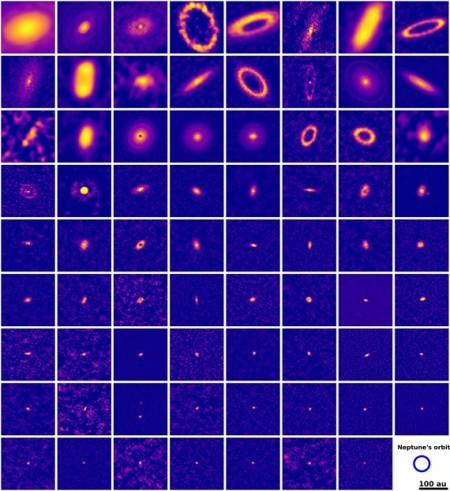Survey of protoplanetary disks finds their size varies significantly
A survey of the protoplanetary disks in a star-forming region about 400 light years from Earth has found that the size of the disks can vary considerably, with many much smaller than our own solar system.
Using ALMA [Atacama Large Millimeter/submillimeter Array in Chile], the researchers imaged all known protoplanetary discs around young stars in Lupus, a star forming region located about 400 light years from Earth in the southern constellation Lupus. The survey reveals that two-thirds of the 73 discs are small, with an average radius of six astronomical units, this is about the orbit of Jupiter. The smallest disc found was only 0.6 astronomical units in radius, smaller than the orbit of Earth.
…The small discs were primarily found around low-mass stars, with a mass between 10 and 50 percent of the mass of our Sun. This is the most common type of star found in the universe.
You can read the research paper here [pdf]. The image to the right, figure 1 from the paper, shows 71 of those disks, with two-thirds clearly much smaller than our solar system.
Because exoplanet surveys have found many small exoplanets around low-mass stars, this new data suggests that planets can also form from these small accretion disks, and that planet formation is also ubiquitous throughout the universe.
On Christmas Eve 1968 three Americans became the first humans to visit another world. What they did to celebrate was unexpected and profound, and will be remembered throughout all human history. Genesis: the Story of Apollo 8, Robert Zimmerman's classic history of humanity's first journey to another world, tells that story, and it is now available as both an ebook and an audiobook, both with a foreword by Valerie Anders and a new introduction by Robert Zimmerman.
The print edition can be purchased at Amazon or from any other book seller. If you want an autographed copy the price is $60 for the hardback and $45 for the paperback, plus $8 shipping for each. Go here for purchasing details. The ebook is available everywhere for $5.99 (before discount) at amazon, or direct from my ebook publisher, ebookit. If you buy it from ebookit you don't support the big tech companies and the author gets a bigger cut much sooner.
The audiobook is also available at all these vendors, and is also free with a 30-day trial membership to Audible.
"Not simply about one mission, [Genesis] is also the history of America's quest for the moon... Zimmerman has done a masterful job of tying disparate events together into a solid account of one of America's greatest human triumphs."--San Antonio Express-News
A survey of the protoplanetary disks in a star-forming region about 400 light years from Earth has found that the size of the disks can vary considerably, with many much smaller than our own solar system.
Using ALMA [Atacama Large Millimeter/submillimeter Array in Chile], the researchers imaged all known protoplanetary discs around young stars in Lupus, a star forming region located about 400 light years from Earth in the southern constellation Lupus. The survey reveals that two-thirds of the 73 discs are small, with an average radius of six astronomical units, this is about the orbit of Jupiter. The smallest disc found was only 0.6 astronomical units in radius, smaller than the orbit of Earth.
…The small discs were primarily found around low-mass stars, with a mass between 10 and 50 percent of the mass of our Sun. This is the most common type of star found in the universe.
You can read the research paper here [pdf]. The image to the right, figure 1 from the paper, shows 71 of those disks, with two-thirds clearly much smaller than our solar system.
Because exoplanet surveys have found many small exoplanets around low-mass stars, this new data suggests that planets can also form from these small accretion disks, and that planet formation is also ubiquitous throughout the universe.
On Christmas Eve 1968 three Americans became the first humans to visit another world. What they did to celebrate was unexpected and profound, and will be remembered throughout all human history. Genesis: the Story of Apollo 8, Robert Zimmerman's classic history of humanity's first journey to another world, tells that story, and it is now available as both an ebook and an audiobook, both with a foreword by Valerie Anders and a new introduction by Robert Zimmerman.
The print edition can be purchased at Amazon or from any other book seller. If you want an autographed copy the price is $60 for the hardback and $45 for the paperback, plus $8 shipping for each. Go here for purchasing details. The ebook is available everywhere for $5.99 (before discount) at amazon, or direct from my ebook publisher, ebookit. If you buy it from ebookit you don't support the big tech companies and the author gets a bigger cut much sooner.
The audiobook is also available at all these vendors, and is also free with a 30-day trial membership to Audible.
"Not simply about one mission, [Genesis] is also the history of America's quest for the moon... Zimmerman has done a masterful job of tying disparate events together into a solid account of one of America's greatest human triumphs."--San Antonio Express-News



I still remember the close-stellar-approach theory of planetary formation being taught in 5th grade science class. In this theory a filament of matter was drawn from the stars and coalesced into planets around one or both of them. In fact, this seemed to be the only theory taught!
My teacher, Mr. Pulaski, was a WWII vet, and was mightily impressed that I knew what the U in U-boat meant, and said it in German (unterzee). When I said that this theory meant that planets would be almost non-existent, he admonished me about the laws of.very large numbers: anything that CAN happen, WILL happen… and it will happen a lot! Never forgot that.